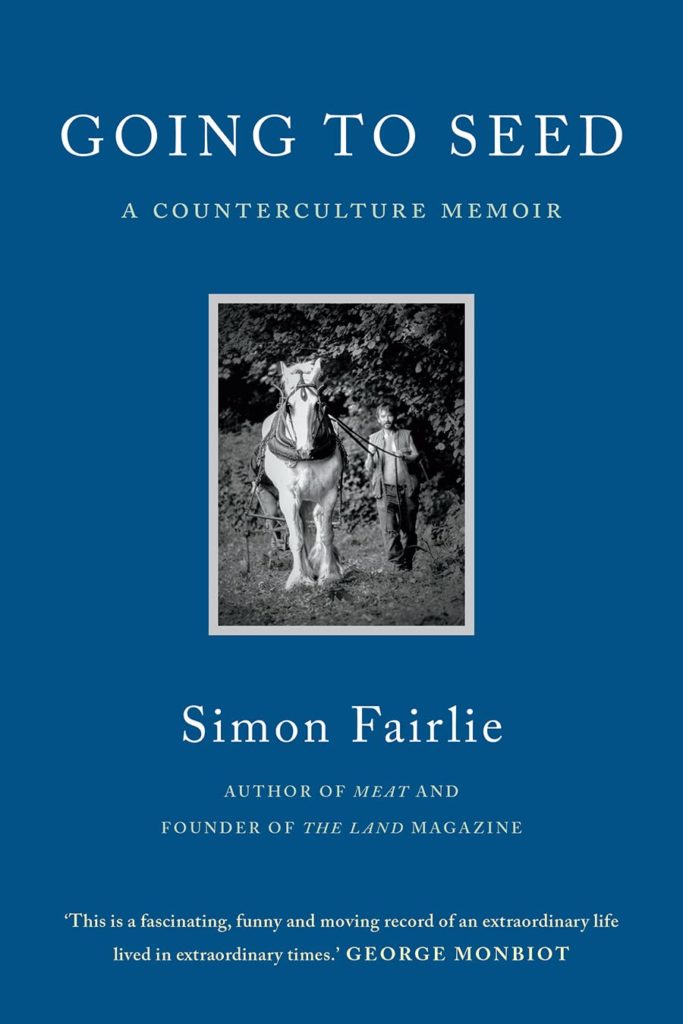Reading Simon Fairlie’s ‘Going to Seed: A Counterculture Memoir’ — a chronicle of the author’s 50-year pursuit of self-sufficiency, freedom, authenticity and a deep connection to the land — is like getting on a trans-continental train for the trip of a lifetime, writes Sue Brooks.

I first came across Simon Fairlie in the pages of The Land magazine. It has to my mind, impeccable credentials. An occasional publication in black and white, taking no paid advertising and using illustrations from line drawings, woodcuts and engravings. The co-editors have produced two issues per year since 2006 on the basis of ‘campaigning peacefully for access to land, its resources and the decision making processes affecting them.’ There are often specific themes — Human Population, Rewilding, Livestock, Water, Fire — with well-documented articles and features, many of them written by Simon Fairlie. Who is this man from whom I am learning so much?
There are two other books — Meat: A Benign Extravagance (arguing the case for small-scale livestock farming) and the earlier Rural Planning Handbook for Low Impact Developers — but this one is like getting on a trans-continental train for the trip of a lifetime. The title is attributed to Timothy Leary:
‘What happened to all the flower children? They went to seed.’
Not, as I understand it, in the human sense of being past their prime, but in the plant sense of reaching the fulfilment of existence. Going to Seed: A Counterculture Memoir.
Born in 1951, the only son (two sisters) of an ambitious father who wrote for The Spectator in London and The New Republic in the USA, where he lived for twenty five years, and insisted Simon should have a private education. Prep school aged seven, public school and sometimes state school when the heavy drinking Henry Fairlie defaulted on the fees, and finally to Cambridge in 1969 where he dropped out at the end of the first year. ‘I threw the I Ching and it came up with hexagram 29 line 6: shut in between thorn-edged prison walls: For three years one does not find the way’.
As a teenager, Simon had been involved in the anti-Vietnam protests in London, crossed the USA by Greyhound Bus and hitchhiked through Afghanistan to India. He was beginning to evolve an ideology which was far removed from an expensive western education — ‘a career is a headlong rush towards doom’. In order to be land-based, he needed practical skills and experience.
Do you remember The Whole Earth Catalogue? I owned a copy once, and lost it in various moves, also The International Times, Small is Beautiful, John Seymour’s Self Sufficiency and multiple issues of Spare Rib. I didn’t manage to play a part in the Back to the Land movement and buy a parcel of land in the late 60s and early 70s. A lifelong regret. In 1974 Simon was well on the way. With a group of friends, he bought 1.4 hectares of land in the South of France — ‘my future sealed for the next ten years.’ Self-sufficency proved impossible on poor, steeply sloping land, but the attempts are nothing less than heroic. He regarded it as an apprenticeship in communal living, practical skills and persistence along the lines of ‘if a fool would persist in his folly, he would become wise.’
The search continued through the 70s and 80s. I sat up late at night watching the Road Protest movement speeding towards the climax at Twyford Down in 1993. Simon comments that it was a turning point in the lives of the protestors — ‘the first opportunity to experience anarchy in action. Living on a protest site was a formative experience in itself, so much so, that the medium — land occupation — became as important as the environmental and political message…the germ of an alternative society.’
The next day I picked up the flowering of that germ — Tinker’s Bubble. Thirty nine acres of woodland and orchard near Yeovil in Somerset which is still going strong in 2022. ‘We forged a collective vision from a disparate group without alienating the locals’. At the end of a long legal battle, Planning Permission was given for Low Impact dwellings for twelve adults. And all WITHOUT fossil fuels. It is a success story to make your heart sing.
Where is he now? You may be surprised to know that Simon Fairlie describes himself as ‘a petty capitalist’, making a modest living, buying and selling Austrian scythes and running a micro dairy at Monkton Wyld. The small farm sustains a resident community and volunteers in fruit, vegetables, the dairy produce from three cows, and enough income from various courses to cover the maintenance of a sprawling Victorian building. It WORKS. As far as capitalism is concerned, Tolstoy would surely give his approval because, as Levin says to his brother after a day’s mowing in Anna Karenina ‘you can’t imagine what an effectual remedy it is for every sort of foolishness’.
(Simon quotes the above as a tribute to the remarkable Peter Vido, who kick-started the scythe movement in Europe and its gathering success in the UK.)
And, perhaps unsurprisingly, he has become a brilliant writer. The year his father died aged 66, by strange synchronicity Simon started work at The Ecologist magazine where Nick Halyard was the editor. ‘No purple passages’ he said, ‘Structure. Structure. Write drunk. Edit sober.’ Advice that has been magnificently realised in this book. The train ride is joyous, exhilarating, often laugh-out-loud funny and packed with hard-won experience. He hasn’t given up on the ideology, he hasn’t stopped looking and he’s always ready for things to change — as they must.
*
‘Going to Seed’ is out now and available here, published by Chelsea Green.